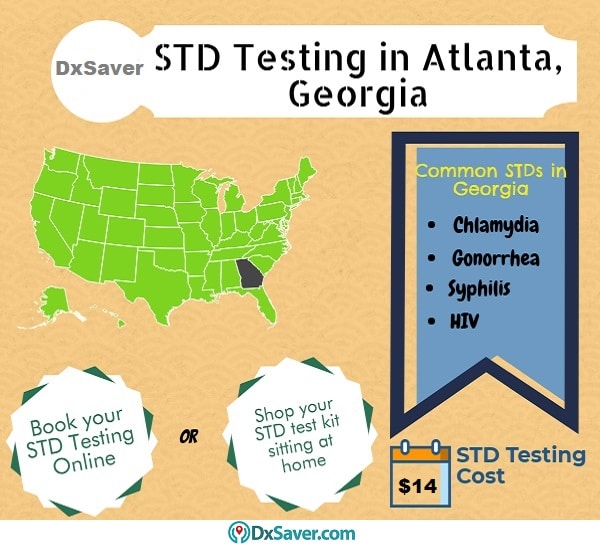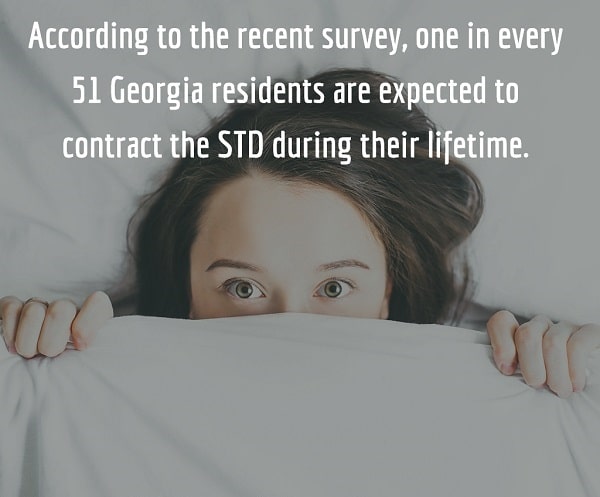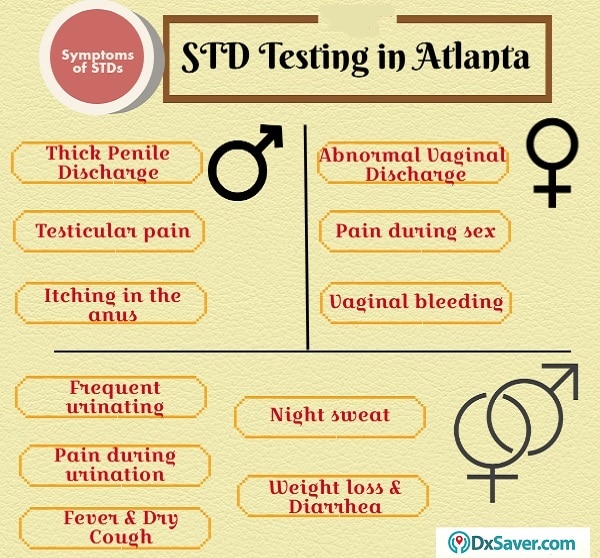
STDs are sexually transmitted diseases caused by microorganisms such as bacteria, viruses, and parasites. Undiagnosed and untreated STDs can lead to severe complications. As the symptoms of STDs do not show up in the early stage of infection, we highly recommend every sexually active person to get tested for STD screening at least once a year.
The article below covers all the significant topics related to sexually transmitted diseases in Atlanta, GA like STD testing cost, the most common STDs in Atlanta, how to check for STDs, preparation, treatment, complications, and where to get tested for STDs.
- STD Testing Cost in Atlanta
- What are STDs?
- How are STDs Transmitted?
- Oral STD
- What are the most common STDs found in Atlanta?
- What are the signs and symptoms of STDs?
- How to check for STDs?
- Is there any preparation required before the STD testing?
- Where to get tested for STDs?
- STD treatment
- Is STD curable?
- What are the methods to prevent STDs?
For our readers, who are very much interested in knowing the STD testing cost in Atlanta, Georgia we would like to begin with that section.
How much does the STD testing cost in Atlanta, Georgia?
STD testing cost ranges between $14 and $444 in different labs and facilities across Atlanta. The cost of STD testing also depends on the specific STD testing or testing for all the STDs (STD panel) of your choice. No prior appointment is required. Compare the price, order your test online and visit the lab near you during lab business hours. Complete the procedure and get the results in your email in 2 to 3 business days.
The following table shows the STD home test kit and STD test cost in Atlanta, Georgia at 3 of our partner laboratories (CLIA – Certified) network located across the U.S.
Name of our Partner Labs | Book Online |
STD Check Labs
| Starting from
|
LetsGetChecked(Home Test Kit)
| Starting from
|
HealthLabs
| Starting from$24 |
STD testing
STD testing involves two steps.
1. Screening test: The screening test is done to check the presence of microorganisms in the body that cause STD. The screening test results have a positive or negative outcome.
2. Diagnostic test: If the screening test results are positive, further diagnostic tests will be performed to find out the exact stage of infection.
STD testing cost in Atlanta with insurance
Many health insurance policies in Atlanta do not cover the cost of STD screening tests. But they might cover the cost of the additional diagnostic tests performed. However, the coverage offered by private health insurance companies and national health insurance programs like Medicare and Medicaid varies widely. So we recommend you to check the coverage of your plan before getting tested for STDs.
Our STD testing providers in Atlanta, GA offer the screening tests for all the STDs. Although our STD testing providers do not accept any kind of health insurance plan, they can provide you with an itemized receipt containing all the details like the name and code of the test, and CPT code that is necessary for insurance reimbursement purposes.

What are STDs?
STDs refer to Sexually Transmitted Diseases. Sexually transmitted diseases are infections caused by microorganisms such as bacteria, viruses, yeast, and parasites that are spread through sexual contact. These microorganisms grow in the genital areas as they are generally moist and warm. STDs are also known as “Venereal Diseases”. There are more than 20 types of common STDs such as Chlamydia, Gonorrhea, Syphilis, Herpes, Hepatitis, HIV, Trichomoniasis, and HPV that affect both men and women.
STD causes, symptoms, risks, and treatment explained in a short 2 minutes video:
How are STDs transmitted?
STDs are generally transmitted through vaginal, anal, or oral sex. They can also spread through blood contact or skin contact with the infected person. Hardly, you may get a sexually transmitted infection when you come into close contact with the moist objects like towels, wet clothing, or toilet seats of the infected person. A pregnant woman infected with an STD can easily pass the disease to her child at birth.
What is oral STD?
Oral STD is getting a sexually transmitted infection through oral sex. Oral sex is the stimulation of genitals using the mouth and tongue. Gonorrhea, Syphilis, and Oral Herpes are the most common oral STDs found in the U.S. Generally, oral STD affects the mouth and throat in both men and women. Fever blisters, sore, and painful throat are common symptoms of oral STD.
What are the most common STDs found in Atlanta, GA?
The following are the most common STDs found in Atlanta.
1. Chlamydia
Chlamydia, the most common sexually transmitted disease is caused by a bacterium called Chlamydia trachomatis. This disease is curable if it is diagnosed and treated at an earlier stage of infection. Some people get Chlamydia infection in the eye which is called Eye Chlamydia and it happens when you touch your eye without washing the hands after sex. Chlamydia infected people never show any symptoms for several weeks but Chlamydia in a severe condition can damage the reproductive system in both men and women. Some of the common symptoms of Chlamydia infection are
- Abnormal genital discharges
- Urge to urinating
- Pain during urination
- Vaginal bleeding in women
2. Gonorrhea
Gonorrhea is caused by the bacterium Neisseria gonorrhoeae and it is sometimes referred to as “The Clap”. It can be experienced with Chlamydia simultaneously. Gonorrhea infects many people in the throat. Some people with Gonorrhea infection do not show any symptoms but if it is left untreated, it may lead to some serious complications. The common symptoms found in Gonorrhea infected people are
- Fever
- Painful joints
- Pain during urination
- Unusual genital discharges
- Testicular pain
- Pain during sexual intercourse
Gonorrhea at an earlier stage of infection can be treated using antibiotics. If it is left untreated, it may lead to infertility in both men and women.
3. Syphilis
Syphilis is one of the common STDs found in Atlanta and it is caused by the bacterium Treponema pallidum. Men having sex with men are more prone to this infection. Syphilis infection occurs in four stages namely primary, secondary, latent, and tertiary stages. The primary and secondary stages of Syphilis infection are the most infectious whereas during the latent stage the bacteria remain inactive and do not show any symptoms. The tertiary stage which is the advanced stage is life-threatening.
In the beginning, a painless sore called chancre appears on the genital areas and rectum indicating that bacterium has entered the body. Symptoms vary during different stages of infection. Primary and secondary stages can be easily treated using a penicillin injection. Syphilis infected people are more vulnerable to HIV infection.
4. HIV
HIV refers to Human Immunodeficiency Virus. It causes a syndrome called AIDS (Acquired Immunodeficiency Syndrome) which is the most advanced stage of HIV. This virus develops in three stages namely the acute stage, chronic stage, and AIDS. It is the most common virus found worldwide and affects the T cells of our immune system. HIV passes through sex, blood, and sometimes prenatally but not through air and water. The most common symptoms of HIV are
- Fever
- Chillness
- Sore throat
- Weight loss
- Night sweat
- Weakness
- Diarrhea
- Dry cough
HIV is the most contagious and deadly virus. It cannot be cured but when diagnosed at an early stage the symptoms of HIV can be controlled using anti-retroviral drugs and the lifespan can be extended.
What are the symptoms of STDs?
Many people with a sexually transmitted infection (STI) do not show any signs or symptoms in the earlier stage of infection. So we recommend every sexually active person to consult a physician if you suspect of having an STD or feeling to be exposed to it. Some of the common signs and symptoms of STD are
Symptoms in women
- Abnormal vaginal discharge
- Pain during urination
- Painful sexual intercourse
- Lower abdominal pain
- Heavy menstrual bleeding
Symptoms in men
- Dark penile discharge
- Burning sensation during urination
- Swelling and pain in the testicles
- Itching in the anus
- Penile irritation
- Painful bowel movements
Common symptoms
- Loss of weight
- Fever
- Headache
- Pain in the joints
- Jaundice
- Diarrhea
- Cough
- Night sweat
- Fatigue
- Sore throat

How to do the STD check?
There are different tests available to check for STDs. Your physician may ask you to take a particular test depending on the sexual history and the symptoms you have. You might be asked to take a blood sample or a urine sample or a sample taken using a swab in the infected area such as mouth, throat, vagina, anus, or penis.
The right time to test for STDs
For more accurate results, physicians recommend waiting for at least a week after the initial exposure. But HIV requires a minimum period of 2 months to get tested. This window period is to ensure an accurate diagnosis.
Is there any preparation required before the STD testing?
There is no special preparation required before the STD testing that requires a blood sample. Only STDs such as Chlamydia and Gonorrhea will be tested using the urine sample. For taking the urine sample, it is compulsory not to urinate for at least one hour before the testing. There is no constraint on the diet. You can carry on with your regular activities.
Where to get tested for STDs?
You can get tested for STDs anywhere in Atlanta nearest to your location. Book your test online, visit your preferred lab anytime during the lab working hours without any prior appointment. After you have taken the test, the test results will be confidentially emailed to you within 2 to 3 working days.
You can also get tested for STDs at your home if you do not have time to visit the lab or if you feel uncomfortable taking the STD test in a commonplace. Order your STD home testing kit online, take the required sample by reading the instructions mentioned in the kit and post the sample back to the given address. The test results will be emailed to you within 5 working days. However, the turnaround of results depends on the receipt of the sample in the lab.
How are STDs treated?
STDs can be treated using antibiotics at the earlier stage of infection. However, the treatment also depends on the type of STD you have. It is very important to take all the antibiotic drugs prescribed even after the symptoms go away. There are some anti-retroviral drugs to manage the symptoms in case of incurable STDs.
Is STD curable?
All the STDs are not curable. Bacteria causing STDs like Chlamydia, Gonorrhea, and Syphilis can be cured at their earlier stage of infection. Viral infections like HIV, Herpes, and Hepatitis can be controlled and managed but cannot be cured. Once infected with these viruses, they will stay with you for your lifetime.
How to prevent STDs?
- Regular vaccinations
- Routine STD check
- Practicing monogamy – not having sex with strangers or people other than your husband/wife
- Not sharing the towels and underclothing
To prevent reinfection, we recommend you to do a post check after 1 month of your past treatment and never practice sex again until you get cured completely.
To get tested for STDs in any other part of the US, please check here STD Testing in the USA
Frequently Asked Questions
Will insurance cover my testing cost?
No, insurance will not be covered in the billing. However, they will provide you a receipt for insurance reimbursement purposes.
How should I book my appointment?
You can choose the most suitable provider from above and make an appointment by following the instructions mentioned by them.
Can I cancel my lab test order?
Yes, you can cancel your lab test order anytime before your testing. A refund will be initiated after deducting the cancellation fee. However, cancellation is at the discretion of the provider.
Do the providers offer result interpretations?
Yes, a few providers may provide doctor consultation who will take you through the results and provide clarification if needed.
How do I receive my report?
To ensure your privacy, the test report will be mailed to you by the provider.
Other topics you may be interested in:-
- Planned Parenthood STD Testing Cost
- At-Home Chlamydia Testing Cost in the US
- Blood in Urine STDs
- Cost of STD Test in San Diego, California
- STD Test Cost in Boston
- STD Test Cost in Denver
- Causes of Bruising on Skin & Other STD Symptoms
- What Types of STDs cause Dry Skin?
- Causes of Penile Rashes and Other STD Symptoms in Men
- What is Metabolism and its Normal Levels?
- HPV in Women: Symptoms, Genital Warts, Treatment and More





